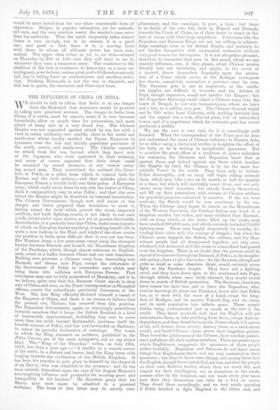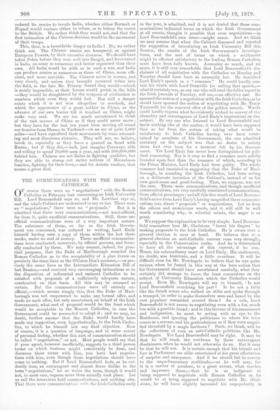THE INFLUENCE OF CHINA ON INDIA.
WE should be loth to affirm that India is in any danger from the Eastward that statesmen would be prudent in taking into practical account. The danger to India from China, if it exists, must be remote, must, if it ever becomes formidable, allow us ample time for preparation, and must admit of being met in a very direct way. The Chinese Empire was not organised against attack by sea, but with a view to retain authority over warlike clans in the north and north-west whose loyalty enabled the Tartar Emperors to tyrannise over the rich and thickly populated provinces of the south, centre, and south-west. The Chinese expected no attack from the sea, beyond which they knew only of the Japanese, who were contented in their isolation, and never of course expected that their rivers could be ascended by aimed steamers, or any vessels carry- ing armed men. They centralised the national life, there- fore, in Pekin, as a point from which to control both the Tartars and the river system,—and that mistake gives the European Powers a terrible hold over their policy. A European army, which could never force its way into the centre of China, finds it comparatively easy to seize Pekin ; and that city once seized the Empire might be dissolved, by internal insurrection. The Chinese Government, though now well aware of this danger, and better prepred than heretofore to meet it, having armed the forts which protect the rivers, imported artillery, and built fighting-vessels, is not likely to run such a risk, except under some motive not yet at present discernible. Nevertheless, it is perfectly true that China, under some impulse of which no European knows anything, is making herself felt in quite a new fashion in the West, and might if she chose render our position in India more difficult than it ever yet has been. Her Western Army a few years since swept away the strongest barrier between Burrnah and herself, the Mussulman kingdom of the Panthays, which, though almost unknown to English- men, acted as a buffer between China and our own dominions. Nothing now prevents a Chinese army from descending into Burmah, and thence into Pegu, except the reluctance of the Government of Pekin to commence WATS which may bring them into collision with European Powers. That reluctance may not be fully understood at Mandalay, and it is, we believe, quite true that the Beaman Court stands in deep. awe of China, and even, as the Times' correspondent at Shanghai affirms, courts the subordinate provincial Governors of the West. The late King officially declared himself a vassal of the Emperor of China, and there is no reason to believe that the present one, Thebau, has swerved from this position. The Nepaulese Government, again, so annoyingly punctilious towards ourselves that it keeps the British Resident in a kind of honourable imprisonment, forbidding him ever to move more than ten miles beyond Katmandoo, professes itself the humble servant of Pekin, and has just forwarded an Embassy, to renew its periodic declaration of vassalage. The terms in which the King demands an audience, published in the Pekin Gazette, are of the most submissive, not to say abject kind. The "King of the Ghoorkas" writes, on July 28th, 1878, less than a year ago :---". A dweller in a remote corner of the earth, in a distant and barren land, the King turns with longing towards the civilisation of the Middle Kingdom. It has been his practice to in glory to himself by the despatch of an Envoy, who was admitted to the presence ; and he has been entirely dependent upon the rays of his August Majesty's awe-inspiring influence and prosperity for securing peace and tranquillity in his borders." He therefore prays that his Envoy may once more he admitted to a personal audience. The form of this letter may be merely coin.- plimentary, and the vassalage, in part, a form ; but there is no doubt of the aWe felt, both in Nepaul and Burmah, towards the Court of China, or of their desire to stand on the best of terms with their huge neighbour. Potentates like the Nepaulese and Burmese Kings are not too willing to acknow, ledge. vassalage, even to far distant Courts, and certainly do not burden themselves with ceremonial embassies without very good reason for the expense. It is not altogether pleasant, therefore, to remember that men in this mood, whom we can • scarcely influence, can, if they please, admit Chinese armies directly into our territories, and might, in the event of a quarrel, throw themselves hopefully upon the protec- tion of a Court which never, as the Kashgar reconquest has shown, completely surrenders a province once its own.. The Burmese gate is not so important, as the north- ern jungles are difficult to traverse, and the defence of Pegu, though expensive, would not involve the Empire ; but the Nepaulese Maharaja could admit a Chinese army into the heart of Bengal, to our very treasure-house, where we have not a fort, or a soldier, or a gun. The Chinese General would not be 350 miles from Calcutta, with nothing between him and the capital but a rich, alluvial plain, full of unfortified towns, and of a population which for centuries past has never produced a soldier.
We say the awe is very real, for it is exceedingly well founded. When the correspondent of the Times says he does not understand the cause of Chinese influence in Eastern Asia, he is either using a rhetorical artifice to heighten the effect of his facts, or he is writing in inexplicable ignorance. Not to mention the great effect of a tradition of power unbroken for centuries, the Burmese and Nepaulese know that as against them, and indeed against any State which touches the Empire by land, the Chinese is by far the most for- midable Power in the world. They have only to irritate Pekin thoroughly, and an army will begin rolling towards them which may take years on its march, or halt for months at a time, but which will inevitably reach them, and not only sweep away their dynasties, but utterly destroy themselves, and fill up their possessions with swarms of Chinese settlers, for practical purposes unlimited in number. If the sea were sentient, the Dutch would be very courteous to the sea. When the Chinese army began to march on the Mussulmans of the Western Provinces, the Panthay Sultan was head of a. kingdom smaller but richer, and more civilised than Burmah, with an army which, as the terror filled up the ranks, may have reached 200,000 men, and which certainly included 70,000 fighting-men. These men fought desperately for months, de- fending their cities with the courage of despair ; but when the Chinese army stopped, the Sultan, the soldiers, and the Mus- sulman people had all disappeared together, not only over- whelmed, but destroyed, as if the ocean or a lava-flood had passed over the kingdom. There is no doubt that the process could be repeated to-morrow throughout Burmah, if Pekin, in its inexplic- able policy, chose to give the order ; for the Burmese,though not quite. so weak as some observers think, would certainly never fight as the Panthays fought. They have not a fighting creed, and they have doors open to the southward into Pegu, through which, when once. fairly alarmed, they would crowd . down in search of British protection. The Burmese, therefore, have reason for their fear, and so have the Nepaulese, who, besides knowing all about the Panthays, know also that Pekin has, AS it were with the wave of a hand, swept the king- dom of Kashgar, and its master, Yakoob Beg, and its cities, and. its male population into infinite epee. These people dislike being exterminated just as much as the rest of the world. They know perfectly well that the English will not exterminate them', or take anything from them, except their in- dependence, and they dread far more the Power which,if it moves at all, will destroy them utterly, destroy them as a sand-storm would, and build Chinese cities above their forgotten graves. They dread the pitilessness of the Chinese, their terrible persist- ence, and above all, their endless numbers. There are points upon which Englishmen exaggerate the ignorance of these people rather foolishly. Nepaulese and Burmese do not know many things that Englishmen know, and are very contented in their ignorance ; but they do know some things, and among them that the English, though brave and skilful, are few, and that the people on their own Eastern border, whom they see every day, and respect for their intelligence, are as numerous as the sands, possess cities by the hundred, and can waste every year more men than they themselves can raise by a levy en masse. They dread them accordingly, and we very much question if Pekin decided to fight England to the bitter end, and
ordered its armies to invade India, whether either Burmah or Nepaul would venture either to refuse, or to betray the secret to the British. We rather think they would not, and that the first intimation of the Chinese decision would be the movement of their troops. This, then, is a formidable danger to India ? No, we rather think not, The Chinese armies are hampered, as against European Powers, by their excessive slowness. We should have taken Pekin before they were well into Bengal, and have raised in India an army as numerous and better organised than their own. All India would be with us in such a war, and India can produce armies as numerous as those of China, more effi- cient, and more movable. The Chinese move in masses, and very slowly, and unless they brought mounted tribes into the field, as the late Mr. Prinsep feared they would—which is nearly impossible, as their horses would perish in the hills —they would be slaughtered by the weapons of civilisation in numbers which even they would feel. But still a danger exists which it is not wise altogether to overlook, and which the appearance of a great soldier in China, or the advance of our own border till it touched on China, might make very real. We are too much accustomed to think of the vast masses of China as if they could nrer move ; but they have for, the last ten years been moving all round our frontier from Bhamo to Yarlcund—on an arc of quite 2,000 miles—and have signalised their movements by some astound- ing and most disastrous victories. They will not, we believe, break in, especially as they have a quarrel on hand with Russia ; but if they did,—well, just imagine Cetewayo able and willing to spend 70,000 men a year, and with 300,000,000 behind him, Chinese are not Zulus in fighting qualities, but they are able to stamp out entire nations of Mussulman fanatics, fighting for their lives,—and for Asiatic warfare, that means a great deal.



































 Previous page
Previous page